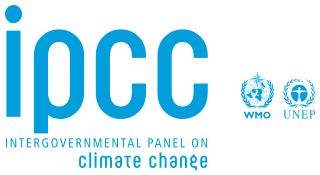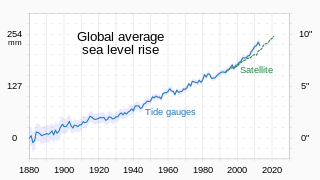Related Research Articles

Mean sea level is an average surface level of one or more among Earth's coastal bodies of water from which heights such as elevation may be measured. The global MSL is a type of vertical datum – a standardised geodetic datum – that is used, for example, as a chart datum in cartography and marine navigation, or, in aviation, as the standard sea level at which atmospheric pressure is measured to calibrate altitude and, consequently, aircraft flight levels. A common and relatively straightforward mean sea-level standard is instead a long-term average of tide gauge readings at a particular reference location.

Sir John Theodore Houghton was a Welsh atmospheric physicist who was the co-chair of the Intergovernmental Panel on Climate Change's (IPCC) scientific assessment working group which shared the Nobel Peace Prize in 2007 with Al Gore. He was lead editor of the first three IPCC reports. He was professor in atmospheric physics at the University of Oxford, former Director General at the Met Office and founder of the Hadley Centre.

Kerkouane or Kerkuane is the site of an ancient Punic city in north-eastern Tunisia, near Cape Bon. Kerkouane was one of the most important Punic cities, with Carthage, Hadrumetum, and Utica. This Phoenician city was probably abandoned during the First Punic War and was not rebuilt by the Romans. It had existed for almost 400 years.

Jonathan Michael Gregory is a climate modeller working on mechanisms of global and large-scale change in climate and sea level on multidecadal and longer timescales at the Met Office and the University of Reading.

Effects of climate change are well documented and growing for Earth's natural environment and human societies. Changes to the climate system include an overall warming trend, changes to precipitation patterns, and more extreme weather. As the climate changes it impacts the natural environment with effects such as more intense forest fires, thawing permafrost, and desertification. These changes impact ecosystems and societies, and can become irreversible once tipping points are crossed. Climate activists are engaged in a range of activities around the world that seek to ameliorate these issues or prevent them from happening.

Climate change adaptation is the process of adjusting to the effects of climate change. These can be both current or expected impacts. Adaptation aims to moderate or avoid harm for people, and is usually done alongside climate change mitigation. It also aims to exploit opportunities. Humans may also intervene to help adjust for natural systems. There are many adaptation strategies or options. For instance, building hospitals that can withstand natural disasters, roads that don't get washed away in the face of rains and floods. They can help manage impacts and risks to people and nature. The four types of adaptation actions are infrastructural, institutional, behavioural and nature-based options. Some examples of these are building seawalls or inland flood defenses, providing new insurance schemes, changing crop planting times or varieties, and installing green roofs or green spaces. Adaptation can be reactive or proactive.
Michael Oppenheimer is the Albert G. Milbank Professor of Geosciences and International Affairs in the Princeton School of Public and International Affairs, the Department of Geosciences, and the High Meadows Environmental Institute at Princeton University. He is the director of the Center for Policy Research on Energy and the Environment (C-PREE) at the Princeton School of Public and International Affairs and Faculty Associate of the Atmospheric and Ocean Sciences Program and the Princeton Institute for International and Regional Studies.

The IPCC Fourth Assessment Report (AR4) is a report on climate change created with the help of a large number of contributors, both scientists and governmental representatives. There has been considerable political controversy over a small number of errors found in the report, and there have been calls for review of the process used to formulate the report. The overwhelming majority view of scientists with expertise in climate change is that errors, when found, are corrected, and the issues as identified do not undermine the conclusions of the report that the climate system is warming in response to increased levels of greenhouse gases, largely due to human activities.
Pier Vellinga is an environmental scientist and one of the Netherlands' experts on the impacts of climate change.

Ove Hoegh-Guldberg, is a biologist and climate scientist specialising in coral reefs, in particular bleaching due to global warming and climate change. He has published over 500 journal articles and been cited over 50,000 times.

Between 1901 and 2018, the average sea level rose by 15–25 cm (6–10 in), with an increase of 2.3 mm (0.091 in) per year since the 1970s. This was faster than the sea level had ever risen over at least the past 3,000 years. The rate accelerated to 4.62 mm (0.182 in)/yr for the decade 2013–2022. Climate change due to human activities is the main cause. Between 1993 and 2018, melting ice sheets and glaciers accounted for 44% of sea level rise, with another 42% resulting from thermal expansion of water.

Climate change affects tropical cyclones in a variety of ways: an intensification of rainfall and wind speed, an increase in the frequency of very intense storms and a poleward extension of where the cyclones reach maximum intensity are among the consequences of human-induced climate change. Tropical cyclones use warm, moist air as their source of energy or fuel. As climate change is warming ocean temperatures, there is potentially more of this fuel available.

Climate change in Pakistan is a major issue for the country. Pakistan is highly vulnerable to climate change. As with the changing climate in South Asia as a whole, the climate of Pakistan has changed over the past several decades, with significant impacts on the environment and people. In addition to increased heat, drought and extreme weather in parts of the country, the melting of glaciers in the Himalayas has impacted some of the important rivers of Pakistan. Between 1999 and 2018, Pakistan ranked 5th in the countries affected by extreme weather caused by climate change.

The contributions of women in climate change have received increasing attention in the early 21st century. Feedback from women and the issues faced by women have been described as "imperative" by the United Nations and "critical" by the Population Reference Bureau. A report by the World Health Organization concluded that incorporating gender-based analysis would "provide more effective climate change mitigation and adaptation."

Climate change adaptation strategies on the German coast include European, national, and regional politics, different economic and civilian sectors as well as coastal protection. In general, climate change refers to statistically identifiable changes in climate properties that persist over a longer period of time. The United Nations Framework Convention on Climate Change (UNFCCC) defines it as a change in climate caused by human activity that can be observed in addition to natural climate variability. This can be described as anthropogenic climate change. Climate change poses local level impacts on the German coast and for the present and future, suitable adaptation strategies are necessary. In 2008, the Federal Cabinet of Germany decided on a German Climate Change Adaptation Strategy with the objective of creating a national action framework for reducing the risks for the population, habitats as well as the economy.

Climate change in Senegal will have wide reaching impacts on many aspects of life in Senegal. Climate change will cause an increase in average temperatures over west Africa by between 1.5 and 4 °C by mid-century, relative to 1986–2005. Projections of rainfall indicate an overall decrease in rainfall and an increase in intense mega-storm events over the Sahel. The sea level is expected to rise faster in West Africa than the global average. Although Senegal is currently not a major contributor to global greenhouse gas emissions, it is one of the countries most vulnerable to climate change.
Climate change vulnerability is a concept that describes how strongly people or ecosystems are likely to be affected by climate change. Its formal definition is the "propensity or predisposition to be adversely affected" by climate change. It can apply to humans and also to natural systems. Issues around the capacity to cope and adapt are also part of this concept. Vulnerability is a component of climate risk. It differs within communities and also across societies, regions, and countries. It can increase or decrease over time. Vulnerability is generally a bigger problem for people in low-income countries than for those in high-income countries.
Climate change may have a range of impacts in Ireland. Increasing temperatures may change weather patterns, with the potential for increased heatwaves, rainfall and storm events, with subsequent impacts on people through flooding Climate change has been assessed to be the single biggest threat to Ireland, according to the head of the Defence Forces of Ireland, Mark Mellett.

Robert Nicholls is currently the Director of the Tyndall Centre for Climate Change Research and a professor of climate adaptation at the University of East Anglia in Norwich, United Kingdom.

The Low Elevation Coastal Zone (LECZ) refers to low-lying coastal areas with an elevation below a certain threshold, commonly 10 meters, above mean sea level. Globally, there is a substantial and growing population living in the Low Elevation Coastal Zone, which consists of approximately 2% of the world's land area and around 11% of the global population. The LECZ is an area of interest because it represents areas that are and will be vulnerable to impacts of flooding and sea level rise due to climate change.
References
- 1 2 3 "Robert Devoy". UCC. Retrieved 13 August 2018.
- 1 2 3 "Robert Devoy - MaREI". MaREI. Retrieved 13 August 2018.
- ↑ "Irish warned of doomsday sea levels if climate change continues". IrishCentral.com. 10 January 2015. Retrieved 13 August 2018.
- ↑ "OPW engineer defends Cork flood defence plan amid criticism". The Irish Times . Retrieved 13 August 2018.